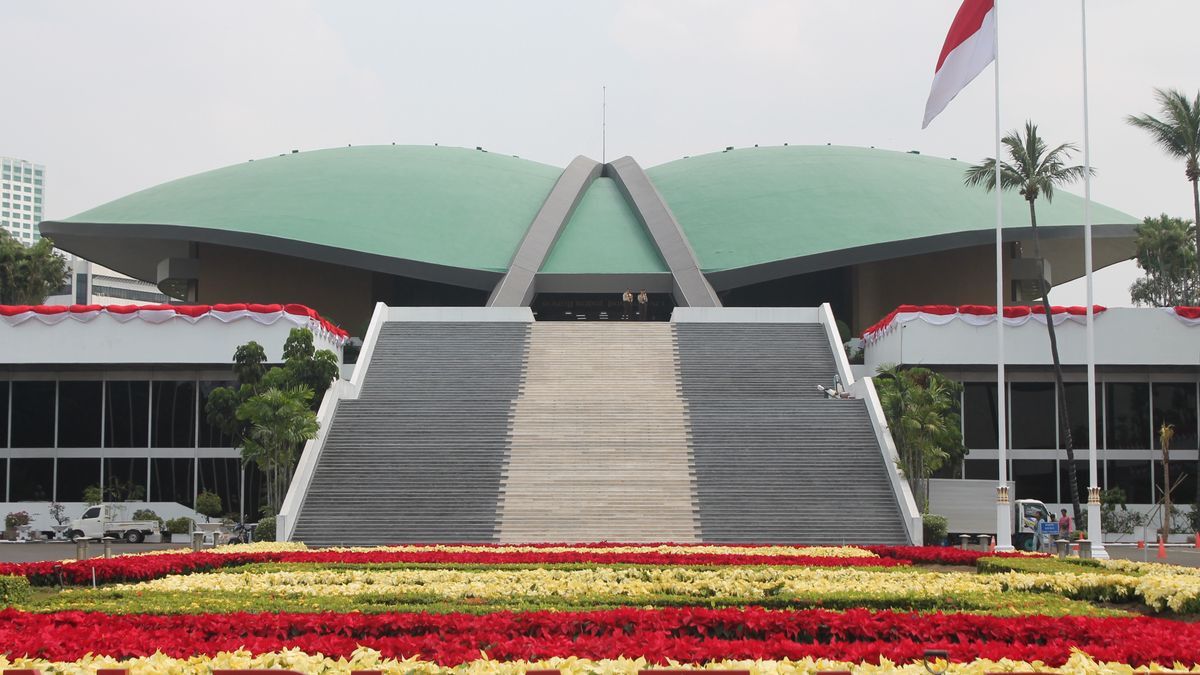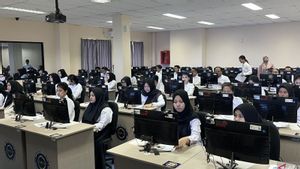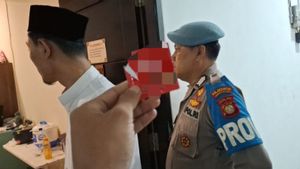JAKARTA - The discussion of the Draft Law on Pancasila Ideology (RUU HIP) became a polemic. A number of parties consider that the discussion of the draft legislation does not need to be continued. Because, this bill is deemed unnecessary by the community.
Researcher for the Community Concerned Parliamentary Forum (Formappi), Lucius Karus, said that the DPR initiative bill seemed to be more immediate than other bills included in the 2020 Priority Prolegnas list.
This raises questions for him. What is the urgent situation that makes the DPR want to discuss and pass this law in the midst of the COVID-19 crisis?
"The class of urgency of this bill by the DPR and the government is the same as the Job Creation Bill. The difference is that if the work creation is proposed by the government, the HIP bill is an initiative of the DPR," Lucius told VOI, Monday, June 15.
He further compared the Job Creation Bill and the HIP Bill. He said, despite all the controversy, the Job Creation Bill could be considered important as the government's effort to meet the needs of the community and boost the national economy during this period.
This is very different from the HIP Bill which was proposed by the DPR. "It is very difficult to explain the urgency in meeting people's needs," he said.
According to him, this bill seems to be setting something ideal, containing ideas and guidelines related to the implementation of Pancasila.
The Pancasila course is needed, he said. However, making it a law can actually be a new problem.
"There is nothing wrong with the elaboration, but what is the importance of making it into a single law in itself? That description should be included in the explanation of all laws made by the DPR to explain the principles for making laws based on Pancasila," he said.
Lucius also looked oddly at the draft legislation that had emerged from council members. According to him, this actually proves how confused the parliament is in reading the needs of the people which should be their job.
"When they prioritize the bill which is directed more towards state administrators and also only explains Pancasila, then there must be something strange in our palemen," he said.
Executive Director of Indonesia Political Review, Ujang Komarudin, also thought it would be better if the discussion of this draft law was canceled. Apart from not having any urgency in society, the HIP Bill is considered to be able to heat up the current political atmosphere.
"If it is enforced, it could be that many components of society will move to reject the HIP Bill. If it really goes down, it will be crowded," he said.
Moreover, the Draft Law on HIP is considered to have touched a sensitive issue in this country, "The issue of the rise of the PKI," he said.
The Central Executive of PP Muhamadiyah also expressed their objection regarding the discussion of the draft law. Chairman of PP Muhammadiyah Haedar Nasir assessed that the DPR should be able to pay more attention to the voices that are busy in the community. Including, the vote of rejection of the bill.
"The DPR must be more sensitive and accommodating to the aspirations of the Indonesian people who reject the HIP Bill by not imposing discussions on the HIP Bill for certain groups," he said in his written statement.
The DPR, continued Haedar, does have the authority to decide policies without listening to public aspirations. However, Haedar asked the DPR to prioritize the unity and progress of Indonesia rather than its own group.
He also reminded the DPR to have a responsibility towards the power they have. Moreover, power is a mandate. According to him, PP Muhammadiyah did not want the government and the DPR to repeat their mistakes in the past.
This is because the formulation of policies on the application of the Pancasila ideology is often misused by the authorities to become an instrument of monolithic power.
After polemics, the party changed its attitudeThe HIP Bill was supported by 7 out of 9 factions and passed as an initiative bill in a plenary meeting on May 12.
In the meeting minutes document dated 22 April on the official website dpr.go.id, it was noted that the Democratic Party Faction did not participate in the discussion of the draft which ended in this polemic.
Meanwhile, the PKS Faction agrees with the note that this bill must include the provisions of the TAP MPRS Number XXV / MPRS / 1966 concerning the dissolution of the Indonesian Communist Party and the Prohibition of Any Activities to Spread and Develop Communism / Marxism-Leninism.
"Based on the opinion of the factions (F-PDI Perjuangan, F-PG, F-PGerindra, F-PNasdem, F-PKB, F-PAN, and F-PPP) accept Panja's work and approve the Bill on the Path of Pancasila Ideology. further processed in accordance with the prevailing laws and regulations, "wrote the minutes of the meeting document.
Although initially agreed, the PAN faction decided to withdraw their support after the polemic of this law took place in the community. They asked that this draft be removed from the national legislation program.
"The PAN faction now wants to urge all parties in the DPR to reconsider to continue this discussion. If necessary, immediately withdraw from the National Legislation Program," said Deputy Chairman of the PAN Faction Saleh Partaonan Daulay to reporters.
He explained that PAN initially approved the bill if it included TAP MPRS Number XXV / MPRS / 1966. However, seeing a lot of criticism from the public, they decided they no longer supported it.
Moreover, PAN does not agree that Pancasila should be explained through a statutory level regulation. This is because Pancasila has been noble since it was agreed to be the basis of the Indonesian state. "What is clear is that we already feel that Pancasila is final and so far since 1966 to this day we are calm there is no problem," he said.
Meanwhile, the PDI-P agreed to abolish the articles regulating the main characteristics of Pancasila to become Trisila and Ekasila in the HIP Bill.
PDIP Secretary General Hasto Kristiyanto said the stance was taken after they heard the aspirations of the community regarding the polemic bill.
"Thus, with regard to the content contained in Article 7 of the Draft Law on HIP related to the main characteristics of Pancasila as Trisila whose crystallization in Ekasila, PDI Perjuangan agreed to be deleted," said Hasto in his written statement.
The contents of Article 7 of the HIP Bill are as follows:
Paragraph (1) The main characteristics of Pancasila are justice and social welfare with a family spirit which is a combination of the principles of divinity, humanity, unity, democracy / political and economic democracy in one unit.
Paragraph (2) The main characteristics of Pancasila are in the form of trisila, namely: socio-nationalism, socio-democracy, as well as cultural divinity.
Paragraph (3) Trisila as referred to in paragraph (2) is crystallized in ekasila, namely mutual cooperation.
Meanwhile, regarding the absence of TAP MPRS Number XXV / MPRS / 1966, Hasto said, PDIP had accepted these aspirations. The party bearing the bull symbol stated that the HIP Bill prohibited ideas such as communism and other ideas besides Pancasila.
"Likewise, the addition of considering provisions in order to emphasize the prohibition against ideologies that are contrary to Pancasila, such as Marxism-communism, capitalism-liberalism, radicalism and other forms of khilafahism, also agreed to be added," he concluded.
The English, Chinese, Japanese, Arabic, and French versions are automatically generated by the AI. So there may still be inaccuracies in translating, please always see Indonesian as our main language. (system supported by DigitalSiber.id)













